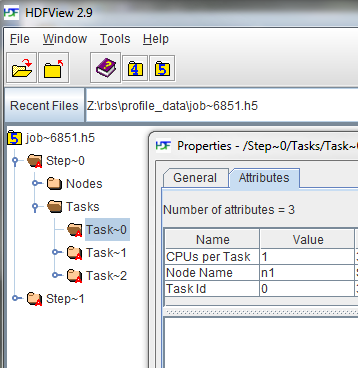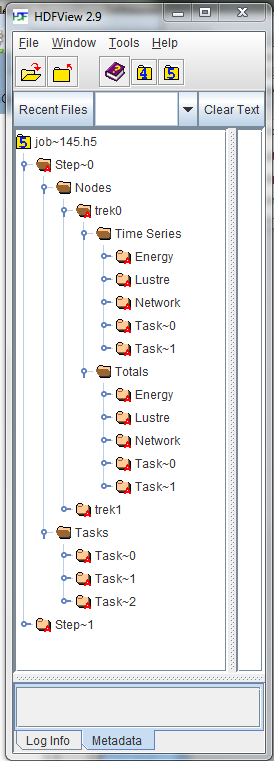Profiling Using HDF5 User Guide
Contents
OverviewAdministration
Profiling Jobs
HDF5
Data Structure
Overview
The acct_gather_profile/hdf5 plugin allows Slurm to coordinate collecting
data on jobs it runs on a cluster that is more detailed than is practical to
include in its database. The data comes from periodically sampling various
performance data either collected by Slurm, the operating system, or
component software. The plugin will record the data from each source
as a Time Series and also accumulate totals for each statistic for
the job.
acct_gather_profile / hdf5プラグインを使用すると、Slurmは、クラスターで実行するジョブに関するデータの収集を調整して、データベースに含めるのに実際的ではない詳細な情報を得ることができます。データは、Slurm、オペレーティングシステム、またはコンポーネントソフトウェアによって収集されたさまざまなパフォーマンスデータを定期的にサンプリングしたものです。プラグインは、各ソースからのデータを時系列として記録し、ジョブの各統計の合計も累積します。
Time Series are energy data collected by an acct_gather_energy plugin,
I/O data from a network interface collected by an acct_gather_interconnect
plugin, I/O data from parallel file systems such as Lustre collected by an
acct_gather_filesystem plugin, and task performance data such as local disk I/O,
cpu consumption, and memory use from a jobacct_gather plugin.
Data from other sources may be added in the future.
時系列は、acct_gather_energyプラグインによって収集されたエネルギーデータ、acct_gather_interconnectプラグインによって収集されたネットワークインターフェイスからのI / Oデータ、acct_gather_filesystemプラグインによって収集されたLusterなどの並列ファイルシステムからのI / Oデータ、およびローカルディスクなどのタスクパフォーマンスデータです。 jobacct_gatherプラグインからのI / O、CPU消費、メモリ使用量。他のソースからのデータは将来追加される可能性があります。
The data is collected into a file on a shared file system for each step on
each allocated node of a job and then merged into an HDF5 file.
Individual files on a shared file system was chosen because it is possible
that the data is voluminous so solutions that pass data to the Slurm control
daemon via RPC may not scale to very large clusters or jobs with
many allocated nodes.
データは、ジョブに割り当てられた各ノードのステップごとに、共有ファイルシステム上のファイルに収集され、HDF5ファイルにマージされます。RPCを介してSlurm制御デーモンにデータを渡すソリューションが非常に大規模なクラスターまたは多くの割り当てられたノードを持つジョブに拡張されない可能性があるため、データが膨大になる可能性があるため、共有ファイルシステム上の個々のファイルが選択されました。
A separate
Slurm Profile Accounting Plugin API (AcctGatherProfileType) documents how
to write other Profile Accounting plugins.
別のSlurmプロファイルアカウンティングプラグインAPI(AcctGatherProfileType)は、他のプロファイルアカウンティングプラグインの記述方法を文書化しています。
Administration
Shared File System
The HDF5 Profile Plugin requires a common shared file system on all
the compute nodes. While a job is running, the plugin writes a
file into this file system for each step of the job on each node. When
the job ends, the merge process is launched and the node-step files
are combined into one HDF5 file for the job.
HDF5プロファイルプラグインでは、すべての計算ノードに共通の共有ファイルシステムが必要です。ジョブの実行中、プラグインは各ノードのジョブの各ステップでこのファイルシステムにファイルを書き込みます。ジョブが終了すると、マージプロセスが開始され、ノードステップファイルがジョブの1つのHDF5ファイルに結合されます。
The root of the directory structure is declared in the ProfileHDF5Dir
option in the acct_gather.conf file. The directory will be created by
Slurm if it doesn't exist. Each user will have
their own directory created in the ProfileHDF5Dir which contains
the HDF5 files. All the directories and files are created by the
SlurmdUser which is usually root. The user specific directories, as well
as the files inside, are chowned to the user running the job so they
can access the files. Since user root is usually creating these
files/directories a root squashed file system will not work for
the ProfileHDF5Dir.
ディレクトリ構造のルートは、acct_gather.confファイルのProfileHDF5Dirオプションで宣言されています。ディレクトリが存在しない場合、Slurmによって作成されます。各ユーザーは、HDF5ファイルを含むProfileHDF5Dirに独自のディレクトリを作成します。すべてのディレクトリとファイルは、通常ルートであるSlurmdUserによって作成されます。ユーザー固有のディレクトリと内部のファイルは、ジョブを実行しているユーザーに割り当てられ、ファイルにアクセスできます。ユーザーrootは通常これらのファイル/ディレクトリを作成しているため、ルートスカッシュファイルシステムはProfileHDF5Dirでは機能しません。
Each user that creates a profile will have a subdirectory in the profile
directory that has read/write permission only for the user.
プロファイルを作成する各ユーザーは、そのユーザーに対してのみ読み取り/書き込み権限を持つプロファイルディレクトリにサブディレクトリを持ちます。
Configuration parameters
The profile plugin is enabled in the
slurm.conf file and it is internally
configured in the
acct_gather.conf file.
プロファイルプラグインはslurm.confファイルで有効にされ、acct_gather.confファイルで内部的に設定されます。
slurm.conf parameters
これにより、HDF5プラグインが有効になります。
AcctGatherProfileType = acct_gather_profile/hdf5
This sets the sampling frequency for data types:これにより、データ型のサンプリング頻度が設定されます。
JobAcctGatherFrequency = <seconds>
acct_gather.conf parameters
These parameters are directly used by the HDF5 Profile Plugin.
これらのパラメーターは、HDF5プロファイルプラグインによって直接使用されます。
- ProfileHDF5Dir = <path>
- ProfileHDF5Default = [options]
This parameter is the path to the shared folder into which the
acct_gather_profile plugin will write detailed data as an HDF5 file.
The directory is assumed to be on a file system shared by the controller and
all compute nodes. This is a required parameter.
このパラメーターは、acct_gather_profileプラグインが詳細データをHDF5ファイルとして書き込む共有フォルダーへのパスです。ディレクトリは、コントローラーとすべての計算ノードによって共有されるファイルシステム上にあると想定されます。これは必須パラメーターです。
A comma delimited list of data types to be collected for each job submission.
Use this option with caution. A node-step file will be created on every
node for every step of every job. They will not automatically be merged
into job files. (Even job files for large numbers of small jobs would fill the
file system.) This option is intended for test environments where you
might want to profile a series of jobs but do not want to have to
add the --profile option to the launch scripts.
The options are described below and in the man pages for acct_gather.conf,
srun, salloc and sbatch commands.
ジョブの送信ごとに収集されるデータタイプのカンマ区切りリスト。このオプションは注意して使用してください。ノードステップファイルは、すべてのジョブのすべてのステップのすべてのノードで作成されます。これらは自動的にジョブファイルにマージされません。(多数の小さいジョブのジョブファイルでもファイルシステムがいっぱいになります。)このオプションは、一連のジョブをプロファイルしたいが、起動に--profileオプションを追加する必要がないテスト環境向けです。スクリプト。オプションについては、acct_gather.conf、srun、salloc、sbatchコマンドのマニュアルページで説明しています。
Time Series Control Parameters
Other plugins add time series data to the HDF5 collection. They typically
have a default polling frequency specified in slurm.conf in the
JobAcctGatherFrequency parameter. The polling frequency can be overridden
using the --acctg-freq
srun parameter.
They are both of the form task=sec,energy=sec,filesystem=sec,network=sec.
他のプラグインは、時系列データをHDF5コレクションに追加します。通常、デフォルトのポーリング頻度は、JobAcctGatherFrequencyパラメーターのslurm.confで指定されています。--acctg-freq srunパラメータを使用して、ポーリング頻度を上書きできます。どちらもtask = sec、energy = sec、filesystem = sec、network = secの形式です。
The IPMI energy plugin also needs the EnergyIPMIFrequency value set
in the acct_gather.conf file. This sets the rate at which the plugin samples
the external sensors. This value should be the same as the energy=sec in
either JobAcctGatherFrequency or --acctg-freq.
IPMIエネルギープラグインには、acct_gather.confファイルで設定されたEnergyIPMIFrequency値も必要です。これにより、プラグインが外部センサーをサンプリングするレートが設定されます。この値は、JobAcctGatherFrequencyまたは--acctg-freqのエネルギー=秒と同じである必要があります。
Note that the IPMI and profile sampling are not synchronous.
The profile sample simply takes the last available IPMI sample value.
If the profile energy sample is more frequent than the IPMI sample rate,
the IPMI value will be repeated. If the profile energy sample is greater
than the IPMI rate, IPMI values will be lost.
IPMIとプロファイルのサンプリングは同期していないことに注意してください。プロファイルサンプルは、最後に使用可能なIPMIサンプル値を取得するだけです。プロファイルエネルギーサンプルがIPMIサンプルレートより頻繁である場合、IPMI値が繰り返されます。プロファイルエネルギーサンプルがIPMIレートよりも大きい場合、IPMI値は失われます。
Also note that smallest effective IPMI (EnergyIPMIFrequency) sample rate
for 2013 era Intel processors is 3 seconds.
また、2013年のインテルプロセッサーの最小有効IPMI(EnergyIPMIFrequency)サンプルレートは3秒です。
Profiling Jobs
Data Collection
The --profile option on salloc|sbatch|srun controls whether data is
collected and what type of data is collected. If --profile is not specified
no data collected unless the ProfileHDF5Default
option is used in acct_gather.conf. --profile on the command line overrides
any value specified in the configuration file.
salloc | sbatch | srunの--profileオプションは、データを収集するかどうか、および収集するデータのタイプを制御します。--profileが指定されていない場合、acct_gather.confでProfileHDF5Defaultオプションが使用されていない限り、データは収集されません。コマンドラインの--profileは、構成ファイルで指定された値を上書きします。
enables detailed data collection by the acct_gather_profile plugin.
Detailed data are typically time-series that are stored in a HDF5 file for
the job.
acct_gather_profileプラグインによる詳細なデータ収集を有効にします。詳細データは通常、ジョブのHDF5ファイルに保存される時系列です。
- All
- All data types are collected. (Cannot be combined with other values.)
すべてのデータ型が収集されます。(他の値と組み合わせることはできません。)
- None
- No data types are collected. This is the default. (Cannot be
combined with other values.)
データタイプは収集されません。これがデフォルトです。(他の値と組み合わせることはできません。)
- Energy
- Energy data is collected.
エネルギーデータが収集されます。 - Filesystem
- Filesystem data is collected. Currently only
Lustre filesystem is supported.
ファイルシステムのデータが収集されます。現在、Lustreファイルシステムのみがサポートされています。 - Network
- Network (InfiniBand) data is collected.
ネットワーク(InfiniBand)データが収集されます。 - Task
- Task (I/O, Memory, ...) data is collected.
タスク(I / O、メモリ、...)データが収集されます。
Data Consolidation
The node-step files are merged into one HDF5 file for the job using the
sh5util.
ノードステップファイルは、sh5utilを使用するジョブの1つのHDF5ファイルにマージされます。
If the job is started with sbatch, the command line may added to the normal
launch script, For example:
ジョブがsbatchで開始された場合、コマンドラインは通常の起動スクリプトに追加されます。次に例を示します。
sbatch -n1 -d$SLURM_JOB_ID --wrap="sh5util -j $SLURM_JOB_ID"
Data Extraction
The sh5util program can also be used to extract
specific data from the HDF5 file and write it in comma separated value (csv)
form for importation into other analysis tools such as spreadsheets.
sh5utilプログラムを使用して、HDF5ファイルから特定のデータを抽出し、それをコンマ区切り値(csv)形式で書き込んで、スプレッドシートなどの他の分析ツールにインポートすることもできます。
HDF5
HDF5 is a well known structured data set that allows heterogeneous but
related data to be stored in one file.
(.i.e. sections for energy statistics, network I/O, Task data, etc.)
Its internal structure resembles a
file system with groups being similar to directories and
data sets being similar to files. It also allows attributes
to be attached to groups to store application defined properties.
HDF5はよく知られた構造化データセットであり、異種の関連データを1つのファイルに格納できます。(つまり、エネルギー統計、ネットワークI / O、タスクデータなどのセクション)。その内部構造はファイルシステムに似ており、グループはディレクトリに、データセットはファイルに似ています。また、属性をグループに添付して、アプリケーション定義のプロパティを格納することもできます。
There are commodity programs, notably
HDFView, for viewing and manipulating these files.
これらのファイルを表示および操作するための汎用プログラム、特にHDFViewがあります。
Below is a screen shot from HDFView expanding the job tree and showing the
attributes for a specific task.
以下は、HDFViewのジョブツリーを展開し、特定のタスクの属性を示すスクリーンショットです。

Data Structure
 |
In the job file, there will be a group for each step of the job.
Within each step, there will be a group for nodes, and a group for tasks.
|
Energy Data
AcctGatherEnergyType=acct_gather_energy/ipmi
is required in slurm.conf to collect energy data.
Appropriately set energy=freq in either JobAcctGatherFrequency in slurm.conf
or in --acctg-freq on the command line.
Also appropriately set EnergyIPMIFrequency in acct_gather.conf.
エネルギーデータを収集するには、slurm.confでAcctGatherEnergyType = acct_gather_energy / ipmiisが必要です。slurm.confのJobAcctGatherFrequencyまたはコマンドラインの--acctg-freqで、energy = freqを適切に設定します。また、acct_gather.confでEnergyIPMIFrequencyを適切に設定します。
Each data sample in the Energe Time Series contains the following data items.
Energe時系列の各データサンプルには、次のデータ項目が含まれています。
- Date Time
- Time of day at which the data sample was taken. This can be used to
correlate activity with other sources such as logs.
データサンプルが取得された時刻。これは、アクティビティをログなどの他のソースと関連付けるために使用できます。 - Time
- Elapsed time since the beginning of the step.
ステップの開始からの経過時間。 - Power
- Power consumption during the interval.
インターバル中の電力消費。 - CPU Frequency
- CPU Frequency at time of sample in kilohertz.
サンプリング時のCPU周波数(キロヘルツ)。
Filesystem Data
AcctGatherFilesystemType=acct_gather_filesystem/lustre
is required in slurm.conf to collect task data.
Appropriately set Filesystem=freq in either JobAcctGatherFrequency in slurm.conf
or in --acctg-freq on the command line.
タスクデータを収集するには、slurm.confでAcctGatherFilesystemType = acct_gather_filesystem / lustreisが必要です。slurm.confのJobAcctGatherFrequencyまたはコマンドラインの--acctg-freqでFilesystem = freqを適切に設定します。
Each data sample in the Filesystem Time Series contains the following data items.
ファイルシステム時系列の各データサンプルには、次のデータ項目が含まれています。
- Date Time
- Time of day at which the data sample was taken. This can be used to
correlate activity with other sources such as logs.
データサンプルが取得された時刻。これは、アクティビティをログなどの他のソースと関連付けるために使用できます。 - Time
- Elapsed time since the beginning of the step.
ステップの開始からの経過時間。 - Reads
- Number of read operations.
読み取り操作の数。 - Megabytes Read
- Number of megabytes read.
読み取られたメガバイト数。 - Writes
- Number of write operations.
書き込み操作の数。 - Megabytes Write
- Number of megabytes written.
書き込まれたメガバイト数。
Network (Infiniband Data)
JobAcctInfinibandType=acct_gather_interconnect/ofed
is required in slurm.conf to collect task data.
Appropriately set network=freq in either JobAcctGatherFrequency in slurm.conf
or in --acctg-freq on the command line.
タスクデータを収集するには、slurm.confにJobAcctInfinibandType = acct_gather_interconnect / ofedisが必要です。slurm.confのJobAcctGatherFrequencyまたはコマンドラインの--acctg-freqでnetwork = freqを適切に設定します。
Each data sample in the Network Time Series contains the following
data items.
ネットワーク時系列の各データサンプルには、次のデータ項目が含まれています。
- Date Time
- Time of day at which the data sample was taken. This can be used to
correlate activity with other sources such as logs.
データサンプルが取得された時刻。これは、アクティビティをログなどの他のソースと関連付けるために使用できます。 - Time
- Elapsed time since the beginning of the step.
ステップの開始からの経過時間。 - Packets In
- Number of packets coming in.
入ってくるパケットの数。 - Megabytes Read
- Number of megabytes coming in through the interface.
インターフェースから入ってくるメガバイト数。 - Packets Out
- Number of packets going out.
発信するパケットの数。 - Megabytes Write
- Number of megabytes going out through the interface.
インターフェースを介して出て行くメガバイト数。
Task Data
JobAcctGatherType=jobacct_gather/linux
is required in slurm.conf to collect task data.
Appropriately set task=freq in either JobAcctGatherFrequency in slurm.conf
or in --acctg-freq on the command line.
タスクデータを収集するには、slurm.confにJobAcctGatherType = jobacct_gather / linuxが必要です。slurm.confのJobAcctGatherFrequencyまたはコマンドラインの--acctg-freqでtask = freqを適切に設定します。
Each data sample in the Task Time Series contains the following data
items.
タスク時系列の各データサンプルには、次のデータアイテムが含まれています。
- Date Time
- Time of day at which the data sample was taken. This can be used to
correlate activity with other sources such as logs.
データサンプルが取得された時刻。これは、アクティビティをログなどの他のソースと関連付けるために使用できます。 - Time
- Elapsed time since the beginning of the step.
ステップの開始からの経過時間。 - CPU Frequency
- CPU Frequency at time of sample.
サンプル時のCPU周波数。 - CPU Time
- Seconds of CPU time used during the sample.
サンプル中に使用されたCPU時間の秒。 - CPU Utilization
- CPU Utilization during the interval.
インターバル中のCPU使用率。 - RSS
- Value of RSS at time of sample.
サンプル時のRSSの値。 - VM Size
- Value of VM Size at time of sample.
サンプル時のVMサイズの値。 - Pages
- Pages used in sample.
サンプルで使用されているページ。 - Read Megabytes
- Number of megabytes read from local disk.
ローカルディスクから読み取られたメガバイト数。 - Write Megabytes
- Number of megabytes written to local disk.
ローカルディスクに書き込まれたメガバイト数。
Last modified 30 January 2020